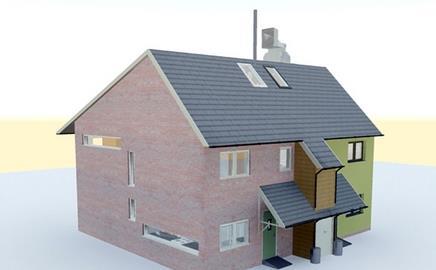Tarmac Limited is set to build two concept homes at the University of Nottingham in order to provide housebuilders and Registered Social Landlords (RSLs) with a blueprint for low cost, scaleable zero-carbon housing which has the potential to be replicated across the UK
The semi-detached properties, which will be built to Levels 6 and 4 of the Code for Sustainable Homes (CfSH) are the next phase of the University of Nottingham’s Creative Energy Homes project and will demonstrate that the highest levels of the CfSH can be attained by using traditional masonry products and techniques.
The company, together with project partners Lovell, the leading affordable housing provider, ZEDfactory Ltd architects and the University of Nottingham’s School of the Built Environment also aims to understand how the highest levels of the CfSH translate into practical reality.
The project will also tackle some of the industry myths that still surround the CfSH, including misconceptions relating to the Green Code product specification and the optimum mix of renewables required for Code Level 6 properties.
Once built, both properties will provide accommodation for visiting academics at the University of Nottingham and a major programme of monitoring will analyse the energy usage and thermal efficiency as well as how occupants potentially have to adapt to living in a Code Level 6 property.
Phil Sabin, Tarmac’s business development manager said: “While there are a number of zero-carbon concept homes, many of these are one-off, concept properties which are not occupied or they are costly ‘Grand Designs’ which do not provide an affordable solution to tackle the problem of volume zero-carbon housing.
“Despite current economic challenges, the Government’s 2016 zero-carbon target for all new properties still remains and it is vital that we use this test-bed project to demonstrate to the construction industry how zero-carbon can be delivered at low cost and with traditional masonry products and products.”

Work begins at the site
Dr Mark Gillott, School of Built Environment, said: “The research we are undertaking here at the University of Nottingham’s is essential due to the massive step changes in design and construction practice required to meet the UK’s Code for Sustainable Homes targets - the post occupancy evaluation of these homes is important in allowing us to understand how they work in reality and not just on paper.”
Lovell regional director Noel Adams said: “Making zero carbon homes a sustainable reality is a key challenge for the housebuilding industry in the lead-up to the Government’s 2016 deadline. This watershed project will play an important role in showing how the challenge can be met.”
ZEDfactory founder Bill Dunster commented: “It is vital that the housebuilding industry gets behind the Code for Sustainable Homes. This project demonstrates how this can be done with reliable off-the-shelf items in a traditional build. The outcome will be a cost-effective Code 6 design that will require almost no lifestlye modifications from the end user in the operation of their home.
“The Tarmac and Lovell team are showing how to meet the higher levels of the Code with the minimum of fuss, in the most cost-effective way, rather than the prevalent alternative strategy that tries to show how different, difficult and expensive it could be. Where there is a will there is a way, and these homes could well show ‘the way’ to an industry looking for excuses whilst the planet overheats,“ said Dunster
The Tarmac Homes will be completed by September 2009.
Postscript
For more information, please visit www.tarmac.co.uk/masonryhome
























